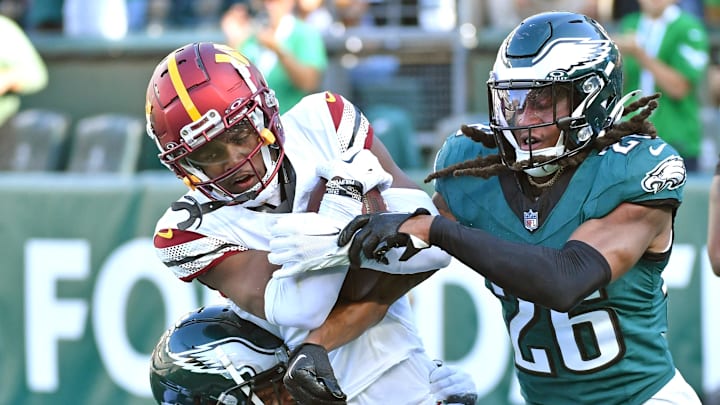Should the Washington Commanders have gone for a two-point conversion in pursuit of victory at the Philadelphia Eagles in Week 4?
Show of hands - who thought the Washington Commanders would go for two at the end of regulation against the Philadelphia Eagles on Sunday? I know I did. I was fairly certain.
The common wisdom suggested as much. Road teams go for the win in such situations. Teams that are perceived as being weaker go for the win in such situations.
The idea is that if you play for overtime, the other team - the home team, or the superior one - has the advantage. And in this case, the Eagles were in fact superior. So why not gamble on one single all-or-nothing play?
Because common wisdom is not the same thing as analytics. It is very easy to criticize Ron Rivera’s decision to play for overtime now that we know the Commanders ended up losing the game. But I will maintain that he made the correct decision.
The standard two-point conversion rate - assuming there are no penalties that change the line of scrimmage - hovers just under 50 percent. It has been within a point or two of that standard for as long as the option has been available. This is one of the great constants in professional football. You have a fifty/fifty chance of converting.
Except you don’t.
Commanders made the right call with two-point conversion
Because that is a league-wide average. It does not take into account a particular team in a particular situation. Here’s another statistic that has been fairly constant for at least the last three years: the Commanders have one of the worst conversion rates in the league.
It is true that they were successful on their try so far this season - when Brian Robinson Jr. bulled his way into the end zone against the Denver Broncos in Week 2. However, you have to consider the individual circumstances.
Denver has among the worst run defenses in the NFL this year. Through the first three weeks, they were giving up 5.6 yards per carry. That is an awful number. The Commanders gained 5.3 yards per carry during their game at Mile High Stadium.
The Eagles, on the other hand, have one of the league’s best defenses versus the run, conceding around three yards per carry. It would be far more difficult for Robinson to push through Fletcher Cox, Jalen Carter, and Jordan Davis.
Of course, Washington would not have to run the ball. They could pass, or try a run-pass option with quarterback Sam Howell. Those plays are very difficult to defend, even if the defense is above average. Assuming the offense executes well.
The Commanders have not executed two-point conversion plays well during Rivera’s coaching tenure. Over the last three seasons, they have never converted more than 30 percent of their tries. Based on that number, you go from having a one-in-two chance to one-in-four.
You can point out that Washington has a better quarterback this season. Howell offers a dual threat that they simply have not had in the past three campaigns. Robinson is a tough runner. The speed of Terry McLaurin and Jahan Dotson, the size of Logan Thomas and Cole Turner, the versatility of Curtis Samuel, and the creativity of Eric Bieniemy - surely all those things would increase the odds.
But to me, they still don’t make it a good bet.
Howell is still very young. Bieniemy is still learning how to get the most out of his talent. And though the Commanders' offensive line is not a train wreck, they are clearly overmatched against the Eagles - especially when it comes to raw power.
Cox and Davis had little trouble with Washington’s interior. When the Commanders resorted to double teams, linebackers Zack Cunningham and Nicholas Morrow were constantly stepping into holes to make stops at the line of scrimmage.
Had Washington thrown, you can bet Eagles defensive coordinator Sean Desai would have stacked the line and put immediate pressure on Howell. He still might have made a play. But my guess is that it would have failed.
As outsiders, we have to trust that the coaches know when they have a play that is likely to work in a given situation. My guess is that Rivera and Bieniemy didn’t think they had it. So they played for overtime.
The Commanders got what they wanted by winning the coin flip. They just couldn’t execute from that point.
I wouldn’t be at all surprised if this same situation were to come up later in the season - after Howell has matured and Bieniemy has a firmer grasp on his players and how they can best be employed - that Rivera would make the opposite decision and go for the win. Perhaps by that point, the offense will be operating at a consistently higher level and will convert.
But I remain skeptical that they would have succeeded on Sunday. Even though I recognize that Washington went on to lose the game, I still think Rivera made the right call in taking the game to overtime.
